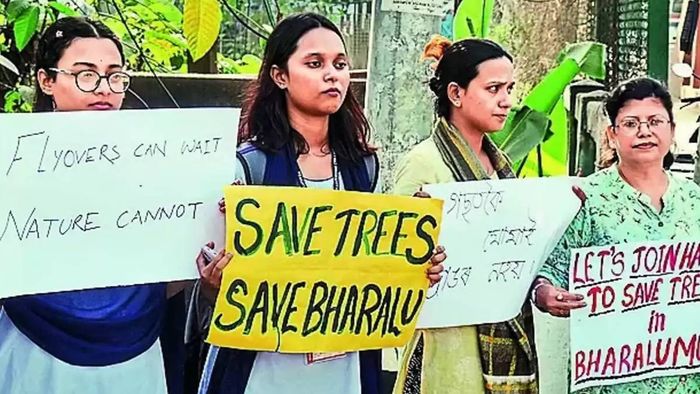Assam: Residents in Guwahati form human chain to oppose tree felling for railway overbridge construction
Around 100 people, including senior citizens and youth, formed a human chain, holding placards and chanting slogans, in an effort to protect the decades-old trees lining the area.

- Nov 09, 2024,
- Updated Nov 09, 2024, 7:24 PM IST
Residents of Guwahati’s Bharalumukh area staged a protest on Saturday to voice their opposition to plans for felling trees in the area to make way for a railway overbridge. Around 100 people, including senior citizens and youth, formed a human chain, holding placards and chanting slogans, in an effort to protect the decades-old trees lining the area.
The protest was organized by a local citizens’ coordination committee concerned about the lack of community consultation on the construction of the bridge near Railway Gate No. 5. Many residents argued that the historic trees are an integral part of Bharalumukh's identity. “These trees are a hallmark of our area,” remarked a septuagenarian who attended the protest. “In our childhood, the Bharalu river was clear, and these trees have stood tall alongside it for generations. Removing them will erase part of our heritage.”
While protesters emphasized they were not opposed to development, they urged for alternative plans that would preserve the area's natural beauty. Another long-time resident voiced hope that authorities would consider the environment in their planning. "There must be a way to construct the bridge without destroying the greenery that defines Bharalumukh," he said.
The protest comes on the heels of a similar movement last month when citizens rallied to protect centuries-old trees around Dighalipukhuri after reports surfaced that about 25 trees might be felled to accommodate a section of a new flyover. That issue reached the Gauhati High Court, which issued notices to the state government concerning the plans.
Amid growing concerns, Assam Chief Minister Himanta Biswa Sarma recently visited the Dighalipukhuri area and dismissed allegations that the Public Works Department (PWD) intended to cut down trees there. Sarma assured the public that alternative solutions were being explored to preserve the trees. “We won’t cut or replant these trees,” he stated, reiterating that large trees could be transplanted if necessary.
The chief minister, however, defended tree-cutting for development in other areas, noting that projects such as flyovers and bridges inevitably require the removal of some trees. "If we want development, we have to accept that some trees will need to be cut," Sarma added. He pointed out that urban development, including residential construction, had led to significant tree felling over the years, underscoring the complexities of balancing progress with environmental conservation.
Also Read: Dynastic politics takes center stage in Assam by-polls